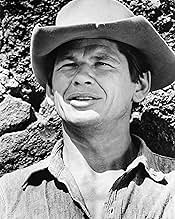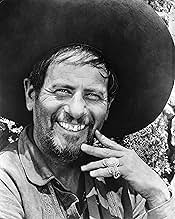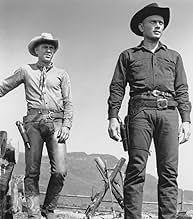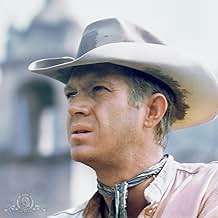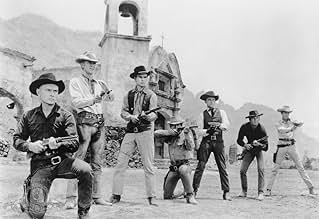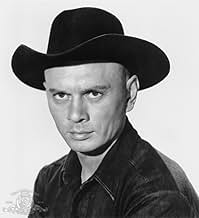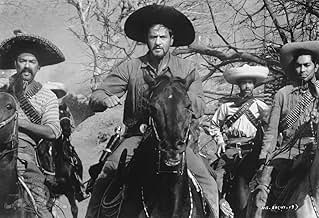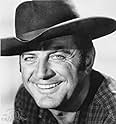Seven gunfighters are hired by Mexican peasants to liberate their village from oppressive bandits.Seven gunfighters are hired by Mexican peasants to liberate their village from oppressive bandits.Seven gunfighters are hired by Mexican peasants to liberate their village from oppressive bandits.
- Nominated for 1 Oscar
- 2 wins & 6 nominations total
Jorge Martínez de Hoyos
- Hilario
- (as Jorge Martinez de Hoyas)
Natividad Vacío
- Villager
- (as Natividad Vacio)
John A. Alonzo
- Miguel
- (as John Alonso)
Summary
Reviewers say 'The Magnificent Seven' has a strong cast, including Yul Brynner and Steve McQueen, and an iconic score. But it's seen as less profound and more formulaic than 'Seven Samurai', which it's a remake of. The Western setting and Hollywood production style differentiate it from the more culturally specific and artistically driven original.
Featured reviews
Re-make are seldom as good as the original, but here Hollywood or rather John Sturges managed to capture some of the spirit of Kurosawa's 'Seven Samurai' which itself owes something to the 'Three Musketeers' and which Sturges duly acknowledged in the credits. Partly this is due to some inspired casting. With the exception of Yul Brynner, none of the actors was particularly well known at the time. Steve McQueen, Charles Bronson, James Coburn, Robert Vaughn, Eli Wallach and Horst Buchholz (an unlikely Mexican) all went on to successful acting careers. The format of this film was replicated in many later films.
The plot couldn't be simpler. Desperate Mexican villagers, bled white by local bandits, retain a group of almost equally desperate gunslingers from the other side of the Rio Grand to deal with the bandits. A lot of the fun arises early on as leader Cajun Chris seeks out half a dozen suitably deranged but deadly types for the job. Ostensibly they are doing it for the money but it becomes apparent early on that they are really on the team just for the hell of it. Once they are together things don't quite go to plan, but the camaraderie holds up, and their mission is accomplished, though at considerable cost.
Despite all the action it is a character-driven piece in some ways. Eli Wallach's Calvera the bandit leader is more than a cardboard cut-out villain and Yul Brynner's enigmatic Chris keeps us guessing. The villagers, despite their matching white smocks, are not all lily-white and each of the Seven has at least one interesting weakness.
A strong feature of the film is the music, penned by the ubiquitous Elmer Bernstein, and entirely appropriate, with a main theme which seems to be permanently welded into my brain.
'The Magnificent Seven' was made at a time when the appetite for westerns was going into decline. Whereas westerns were staple film and TV fare in the 50's, the sixties saw a sharp decline, as spy dramas and sex farces burgeoned. One interesting theory I've heard about this is that it's not so much that the audience tired of westerns, but that TV executives discovered that they were being watched by the people too poor to buy their sponsor's fine products. Anyway this film holds up very well after 45 years, a true classic and satisfying to watch.
The plot couldn't be simpler. Desperate Mexican villagers, bled white by local bandits, retain a group of almost equally desperate gunslingers from the other side of the Rio Grand to deal with the bandits. A lot of the fun arises early on as leader Cajun Chris seeks out half a dozen suitably deranged but deadly types for the job. Ostensibly they are doing it for the money but it becomes apparent early on that they are really on the team just for the hell of it. Once they are together things don't quite go to plan, but the camaraderie holds up, and their mission is accomplished, though at considerable cost.
Despite all the action it is a character-driven piece in some ways. Eli Wallach's Calvera the bandit leader is more than a cardboard cut-out villain and Yul Brynner's enigmatic Chris keeps us guessing. The villagers, despite their matching white smocks, are not all lily-white and each of the Seven has at least one interesting weakness.
A strong feature of the film is the music, penned by the ubiquitous Elmer Bernstein, and entirely appropriate, with a main theme which seems to be permanently welded into my brain.
'The Magnificent Seven' was made at a time when the appetite for westerns was going into decline. Whereas westerns were staple film and TV fare in the 50's, the sixties saw a sharp decline, as spy dramas and sex farces burgeoned. One interesting theory I've heard about this is that it's not so much that the audience tired of westerns, but that TV executives discovered that they were being watched by the people too poor to buy their sponsor's fine products. Anyway this film holds up very well after 45 years, a true classic and satisfying to watch.
I recently subjected "The Magnificent Seven" to just about the toughest test imaginable--I watched it just a few days after "Seven Samurai." And while I'm not going to pretend it's on par with Kurosawa's astounding masterpiece, I have to tip my hat to Hollywood on this one: it's good, DAMN good, among the best American Westerns.
The focus of the screenplay is more on post-Bogart-pre-Eastwood cool banter than the gradual, taciturn character development of "Seven Samurai," but that doesn't mean that the film doesn't have a heart. Considering it clocks in at barely over two hours (compared to the marathonic three and a half of "Samurai"), it actually does a fantastic and very economical job of fleshing out its memorable cast of characters.
One particularly wonderful scene that stuck in my memory from the first time I saw the film ten years ago is the one where Lee (Robert Vaughn), drunk in the middle of the night, confesses his frailties and fear to two of the farmers. The scene (along with the general story of these down-and-out heroes) was groundbreaking in that it began the deconstruction and deromanticization of the Western hero which would be brought to fruition in Sergio Leone's unparalleled spaghetti Westerns.
The star-studded cast wouldn't hold up doing Shakespeare, but they're ideal in this gunslinging, cool-talking tough-guy adventure. As if a lineup of heroes that included Yul Brynner, Steve McQueen, Charles Bronson, and James Coburn wasn't enough, Eli Wallach steals the show as the Mexican bandit chief, a worthy precursor to his classic role "The Good, the Bad, and the Ugly." If the screenplay has a major flaw, it's that his character isn't featured more.
The score is, of course, one of the all-time classics. And while not as alive visually as the Japanese film that inspired it or the Italian Westerns it influenced, it's still mighty fine to look at, and the gunfights don't disappoint.
The pieces add up to one of the great entertaining films of all time, which still manages to be moving and morally aware despite its Hollywoodization of Kurosawa's vision.
The focus of the screenplay is more on post-Bogart-pre-Eastwood cool banter than the gradual, taciturn character development of "Seven Samurai," but that doesn't mean that the film doesn't have a heart. Considering it clocks in at barely over two hours (compared to the marathonic three and a half of "Samurai"), it actually does a fantastic and very economical job of fleshing out its memorable cast of characters.
One particularly wonderful scene that stuck in my memory from the first time I saw the film ten years ago is the one where Lee (Robert Vaughn), drunk in the middle of the night, confesses his frailties and fear to two of the farmers. The scene (along with the general story of these down-and-out heroes) was groundbreaking in that it began the deconstruction and deromanticization of the Western hero which would be brought to fruition in Sergio Leone's unparalleled spaghetti Westerns.
The star-studded cast wouldn't hold up doing Shakespeare, but they're ideal in this gunslinging, cool-talking tough-guy adventure. As if a lineup of heroes that included Yul Brynner, Steve McQueen, Charles Bronson, and James Coburn wasn't enough, Eli Wallach steals the show as the Mexican bandit chief, a worthy precursor to his classic role "The Good, the Bad, and the Ugly." If the screenplay has a major flaw, it's that his character isn't featured more.
The score is, of course, one of the all-time classics. And while not as alive visually as the Japanese film that inspired it or the Italian Westerns it influenced, it's still mighty fine to look at, and the gunfights don't disappoint.
The pieces add up to one of the great entertaining films of all time, which still manages to be moving and morally aware despite its Hollywoodization of Kurosawa's vision.
This is considered one of the all-time great westerns: a real classic, and I can't argue. I've seen a number of faster-moving and better westerns but few with a cast this good that's still entertaining. I never get tired of seeing the stars in this movie. How often are actors like Yul Brynner, Steve McQueen, Charles Bronson, James Coburn and Eli Wallach boring.....or all in the same movie? Not too often. Throw in Robert Vaughn and Horst Buchholz and you have a memorable cast.
As "cool" as McQueen was in his day, in this film Brynner was the "coolest" guy. Just the intense look on his face with those piercing eyes and deep voice command attention whenever he's on screen. Meanwhile, nobody but nobody played a Mexican villain better than Wallach.
The "good guys" in this classic movie are all professional killers and show their human side by admitting their weaknesses and the emptiness of their profession. No one says it better here than Bronson, who gives a couple of very powerful "sermons" to some young boys.
A solid western and a pretty famous theme song, too! It's also another good example of showing some real tough guys who can be convincing without profanity. Can you imagine the dialog if this film was re-made today?!
As "cool" as McQueen was in his day, in this film Brynner was the "coolest" guy. Just the intense look on his face with those piercing eyes and deep voice command attention whenever he's on screen. Meanwhile, nobody but nobody played a Mexican villain better than Wallach.
The "good guys" in this classic movie are all professional killers and show their human side by admitting their weaknesses and the emptiness of their profession. No one says it better here than Bronson, who gives a couple of very powerful "sermons" to some young boys.
A solid western and a pretty famous theme song, too! It's also another good example of showing some real tough guys who can be convincing without profanity. Can you imagine the dialog if this film was re-made today?!
I've seen both the American and Japanese versions many times, and while everyone agrees about which one is better, the American version has some virtues: 1) Our heroes are selected by the farmers when they defend a dead Indian's right to be buried in the same place as white people; therefore they are seen as champions of social and racial equality by the farmers. 2) A magnificent villain played by Eli Wallach. 3) Charlie Bronson's relationship with the village boys. And some tremendous faults: 1) Combining the Young Student and Crazy Fool characters; some of the most poignant scenes in the Japanese version involved the interaction between these two. 2) Not filming the final battle in the rain. And of course many more of each. It's an interesting discussion. Both are great movies that shouldn't be missed. Remember that Kurosawa gave John Sturges a sword in appreciation after seeing his film.
A wonderful classic beautifully scored and shot.
There are so many moody looks between characters, and little movements or idiosyncrasies that just make each of the gunmen seem so real. Apparently, there were big egos behind the camera that caused these acts of showmanship, but unlike most films where the egos clash, here they just build the characters up without harming them.
Yul Brynner and Steve McQueen are just wonderful, and James Coburn and Charles Bronson both put in equal performances. There's just nothing about this film that you can fault, the script is kept light when required and the stunning score lifts up and the acting is huge but never too much. This is a must see again and again.
There are so many moody looks between characters, and little movements or idiosyncrasies that just make each of the gunmen seem so real. Apparently, there were big egos behind the camera that caused these acts of showmanship, but unlike most films where the egos clash, here they just build the characters up without harming them.
Yul Brynner and Steve McQueen are just wonderful, and James Coburn and Charles Bronson both put in equal performances. There's just nothing about this film that you can fault, the script is kept light when required and the stunning score lifts up and the acting is huge but never too much. This is a must see again and again.
Did you know
- TriviaAlthough the film received mixed reviews, Akira Kurosawa was so impressed he sent John Sturges a ceremonial sword as a gift.
- GoofsSteve McQueen wears Levi's jeans with the famous red tab, which were not introduced until the 1930s.
- Quotes
[Calvera has just captured the Seven]
Calvera: What I don't understand is why a man like you took the job in the first place, hmm? Why, huh?
Chris: I wonder myself.
Calvera: No, come on, come on, tell me why.
Vin: It's like a fellow I once knew in El Paso. One day, he just took all his clothes off and jumped in a mess of cactus. I asked him that same question, "Why?"
Calvera: And?
Vin: He said, "It seemed to be a good idea at the time."
- Crazy creditsAnd Introducing Horst Buchholz
- Alternate versionsThe German theatrical release differs from the German VHS video in the scene where the magnificent seven have been taken by surprise and have to put down their weapons on the table. Chico is the last one and stands in enragement. In the theatrical version he then nevertheless unstraps his belt like the others. In the VHS video version Chris jumps at Chico just in that moment when he wants to pull the gun. Chris takes his gun and puts it on desk. Then Chico unstraps his belt.
- ConnectionsFeatured in Precious Images (1986)
- SoundtracksThe Magnificent Seven Theme
Written by Elmer Bernstein
- How long is The Magnificent Seven?Powered by Alexa
Details
- Release date
- Country of origin
- Languages
- Also known as
- Siete hombres y un destino
- Filming locations
- Cuernavaca, Morelos, Mexico(desert, sets)
- Production companies
- See more company credits at IMDbPro
Box office
- Budget
- $2,000,000 (estimated)
- Gross worldwide
- $416
- Runtime
- 2h 8m(128 min)
- Color
- Sound mix
- Aspect ratio
- 2.35 : 1
Contribute to this page
Suggest an edit or add missing content


